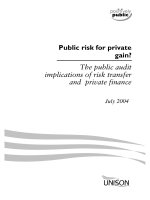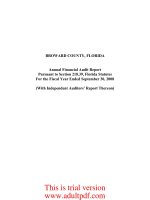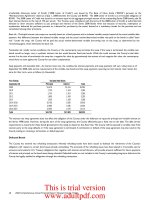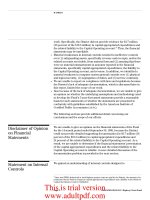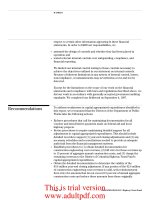CHARTER FINANCIAL AUDIT COMMITTEE OF THE BOARD OF DIRECTORS OF THE AES COPRORATION October 2011 pptx
Bạn đang xem bản rút gọn của tài liệu. Xem và tải ngay bản đầy đủ của tài liệu tại đây (24.74 KB, 6 trang )
CHARTER
FINANCIAL AUDIT COMMITTEE OF
THE BOARD OF DIRECTORS OF
THE AES COPRORATION
October 2011
I. PURPOSE OF THE COMMITTEE
The Audit Committee is created by the Board of Directors of the Company
to assist the Board in its oversight of the integrity of the financial statements and
internal controls of the Company, the qualifications, independence and
performance of the Company’s independent auditor, the performance of the
Company’s internal audit function, compliance by the Company with legal and
regulatory requirements; prepare the audit committee report that Securities and
Exchange Commission rules require to be included in the Company’s annual
proxy statement; and such other matters as are described below.
II. COMPOSITION OF THE COMMITTEE
The Audit Committee shall consist of at least three members, comprised
solely of independent directors meeting the independence and experience
requirements of Section 10A of the Securities Exchange Act of 1934, as amended,
the rules promulgated thereunder and the rules of the New York Stock Exchange.
The Nominating, Governance and Corporate Responsibility Committee of
the Company shall recommend nominees for appointment to the Audit Committee
annually and as vacancies or newly created positions occur. Audit Committee
members shall be appointed by the Board annually and may be removed by the
Board at any time. A majority of the independent members of the Board shall
designate the Chair of the Audit Committee.
III. AUTHORITY AND RESPONSIBILITIES
In addition to any other responsibilities which may be assigned from time
to time by the Board, the Audit Committee is responsible for, the following
matters.
Independent Auditors
The Audit Committee has the sole authority to retain and terminate the
independent auditors of the Company (subject, if applicable, to shareholder
ratification), including sole authority to approve all audit engagement fees and
terms and all non-audit services to be provided by the independent auditors. The
This is trial version
www.adultpdf.com
2
Audit Committee must pre-approve each such non-audit service to be provided by
the Company’s independent auditors. The Audit Committee may consult with
management in the decision making process, but may not delegate this authority
to management. The Audit Committee may, from time to time, delegate its
authority to approve non-audit services on a preliminary basis to one or more
Audit Committee members, provided that such designees present any such
approvals to the full Audit Committee at the next Audit Committee meeting.
The Audit Committee shall review and approve the scope and staffing of
the independent auditors’ annual audit plan(s) and evaluate the independent
auditors’ qualifications, performance and independence, and shall present its
conclusions and recommendations with respect to the independent auditors to the
full Board on at least an annual basis. As part of such evaluation, at least annually,
the Audit Committee shall:
1. obtain and review a report from the Company’s independent
auditors describing: (i) the independent auditor’s internal quality-control
procedures; (ii) any material issues raised by the most recent internal quality-
control review or Public Company Accounting Oversight Board (“PCAOB”)
inspection of the independent auditor, or by any inquiry or investigation by
governmental or professional authorities within the preceding five years,
regarding one or more independent audits carried out by the auditing firm, and
any steps taken to deal with any such issues;
(iii) all relationships between the
independent auditor or any of its affiliates and the Company or persons in a
financial reporting oversight role at the Company, that may reasonably be thought
to bear on the independence of the Company’s independent auditors; and (iv)
assuring compliance with Section 10A of the Securities Exchange Act of 1934.
2. review and evaluate the senior members of the independent auditor
team, particularly the lead audit partner and the auditor responsible for reviewing
the audit;
3. consider whether the audit firm should be rotated in addition to the
rotation of the lead audit partner and the auditor responsible for reviewing the
audit as required by law, so as to assure continuing auditor independence;
4. obtain the opinion of management and the internal auditors on the
independent auditor’s performance; and
5. establish policies for the Company’s hiring of employees or former
employees of the independent auditors.
Internal Auditors
At least annually, the Audit Committee shall evaluate the performance,
responsibilities, budget and staffing of the Company’s internal audit function and
review the annual internal audit plan. Such evaluation shall include a review of
This is trial version
www.adultpdf.com
3
the responsibilities, budget and staffing of the Company’s internal audit function
with the independent auditors. At least annually, the Audit Committee shall
evaluate the performance of the senior internal auditing executive, and make
recommendations to the Board and management regarding the responsibilities,
retention or termination of such executive. The Audit Committee shall review, as
appropriate, the results of internal audits and discuss related significant internal
control matters with the Company’s internal auditor and management.
Financial Statements; Disclosure and Other Risk Management and Compliance
Matters
1. The Audit Committee shall review and discuss with management,
the internal auditors and the independent auditor:
(a) the annual audited financial statements, including the
Company’s disclosures under “Management’s Discussion and Analysis of
Financial Condition and Results of Operations”, prior to the filing of the
Company’s Form 10-K and the quarterly financial statements, including
the Company’s disclosures under “Management’s Discussion and
Analysis of Financial Condition and Results of Operations”, prior to the
filing of the Company’s Form 10-Qs;
(b) any analyses or reports prepared by management, the
internal auditors and/or the independent auditor setting forth significant
accounting or financial reporting issues and judgments made in connection
with the financial statements, including critical accounting estimates and
analyses of the effects of alternative GAAP treatments on the financial
statements;
(c) the effect of regulatory and accounting initiatives or
actions, off-balance sheet structures and related party transactions on the
financial statements of the Company; and any major issues regarding
accounting principles and financial statement presentations, including any
significant changes in the Company’s selection or application of
accounting principles.
2. The Audit Committee shall review, in conjunction with
management, the Company’s earnings press releases and policies with respect to
such press releases and all financial information, such as earnings guidance
provided to analysts and rating agencies including the types of information to be
so provided. The Audit Committee may review any such press release or
financial information as it deems appropriate.
3. The Audit Committee shall receive regular reports from the CEO,
CFO or other members of management on the status of the Company’s disclosure
controls and procedures.
This is trial version
www.adultpdf.com
4
4. The Audit Committee shall review any significant changes in the
Company’s internal controls or other factors that could significantly affect these
controls, including any corrective actions with regard to significant deficiencies
and material weaknesses.
5. The Audit Committee shall review the adequacy of the Company’s
internal control over financial reporting with the internal auditors, the independent
auditor and management, including without limitation, reports regarding (a) all
significant deficiencies and material weaknesses in the design or operation of
internal control over financial reporting and (b) any fraud, whether or not
material, that involves management or other employees who have a significant
role in the Company’s internal control over financial reporting. The Audit
Committee shall review any changes implemented by management to address
control deficiencies or to make controls more effective.
6. The Audit Committee shall review with management, the internal
auditors and the independent auditor management’s annual report on the
Company’s internal control over financial reporting.
7. The Audit Committee shall review and discuss with the independent
auditor those matters required to be discussed by PCAOB Standards, including
but not limited to problems or difficulties regarding the substance of the audit that
have been reported by management concerning the audit, any restrictions on the
scope of activities or access to requested information, any significant
disagreements with management and any other material communications
between the independent auditor and management, such as any management letter
or schedule of unadjusted differences. In addition, the Audit Committee shall
review with the independent auditor any audit problems or difficulties and
management’s response to any communications.
8. The Audit Committee shall review the policies and practices
developed and implemented by management with respect to risk assessment and
risk management, including policies and practices which address the following:
the integrity of the Company’s financial statements; internal controls over
financial reporting and disclosure controls and procedures (including the
performance of the Company’s internal audit function); the performance of the
independent auditor; and the effectiveness of the Company’s Ethics and
Compliance Program. The Committee shall not be responsible to review risk
management or risk assessment processes that are reviewed by the full Board of
Directors, other Committees of the Board, and/or through mechanisms other than
the Audit Committee, which mechanisms are established by Company practice or
policy.
9. The Audit Committee shall monitor the Company’s code of conduct
and compliance with respect thereto, especially as the code relates to conflicts of
interest, related party transactions and illegal acts. The person or persons having
operational responsibility for the Company’s ethics and compliance program shall
This is trial version
www.adultpdf.com
5
have the authority to communicate directly with the Audit Committee or its Chair:
a) promptly on any matter involving criminal conduct or potential criminal
conduct, and b) no less than annually on the implementation and effectiveness of
the Ethics and Compliance Program.
10. The Audit Committee shall establish procedures for: the receipt,
retention and treatment of complaints received by the Company regarding
accounting, internal accounting controls, auditing and code of ethics compliance
matters, and the confidential, anonymous submission by employees of the
Company of concerns regarding such matters, and review any such complaints
and submissions.
11. The Audit Committee shall prepare the audit committee report that
Securities and Exchange Commission rules require to be included in the
Company’s annual proxy statement.
Reporting to the Board
The Audit Committee shall report to the Board at each regularly scheduled
Board meeting and more frequently if the Committee deems that such further
reporting is necessary. This report shall include a review of any issues that arise
with respect to the quality or integrity of the Company’s financial statements and
internal controls, the Company’s compliance with legal or regulatory
requirements, the performance and independence of the Company’s independent
auditors, the performance of the internal audit function and any other matters that
the Audit Committee deems appropriate or is requested to be included by the
Board.
Review of Charter
At least annually, the Audit Committee shall review and assess the
adequacy of this charter and recommend any proposed changes to the Board for
approval.
Evaluation of Audit Committee
At least annually, the Audit Committee shall evaluate its own performance
and report to the Board on such evaluation.
IV. PROCEDURES OF THE COMMITTEE
The Audit Committee shall meet as often as it determines is appropriate to
carry out its responsibilities under this charter, but not less frequently than
quarterly. The Chair of the Audit Committee, in consultation with the other
committee members, shall determine the frequency and length of the committee
meetings and shall set meeting agendas consistent with this charter.
This is trial version
www.adultpdf.com
6
The Audit Committee periodically shall meet separately with
management, with internal auditors or other personnel responsible for the internal
audit function and with the independent auditor.
The Audit Committee is authorized to retain special legal, accounting or
other advisors and may request any officer or employee of the Company or the
Company’s outside counsel or independent auditor to meet with any members of,
or advisors to, the Audit Committee. The Audit Committee may also meet with
the Company’s investment bankers or financial analysts who follow the
Company.
The Audit Committee may delegate its authority to subcommittees of the
Audit Committee when it deems appropriate and in the best interests of the
Company.
V. LIMITATIONS INHERENT IN THE AUDIT COMMITTEE’S ROLE
It is not the duty of the Audit Committee to plan or conduct audits or to
determine that the Company’s financial statements are complete and accurate and
are in accordance with GAAP. This is the responsibility of management and the
independent auditor.
This is trial version
www.adultpdf.com
